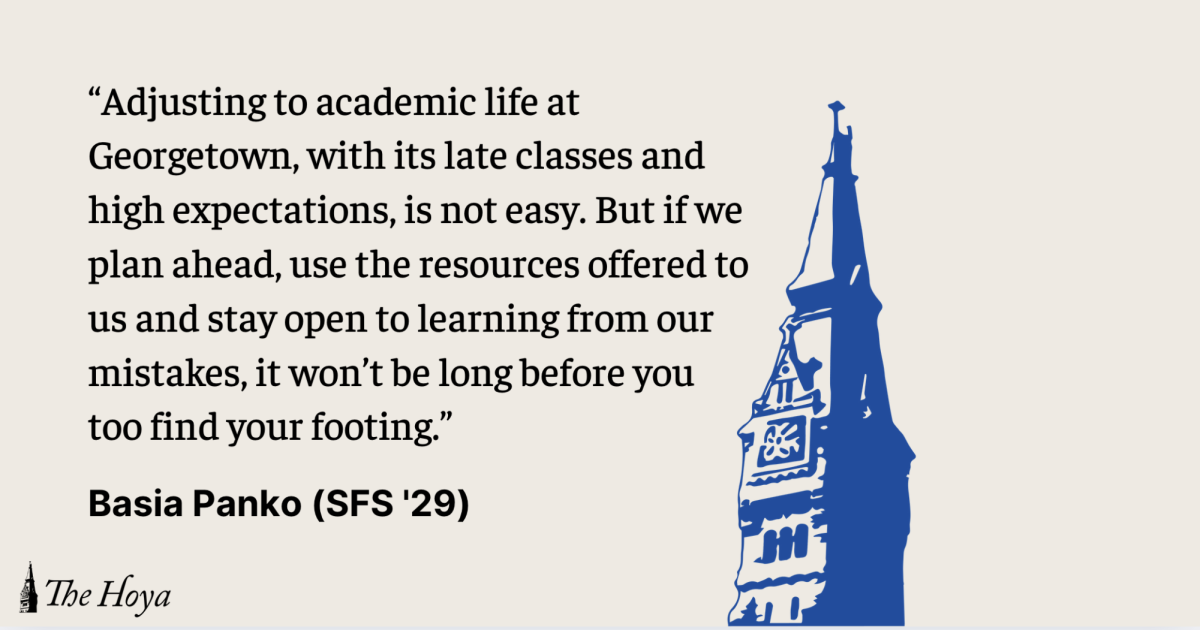
Beginning my first year at Georgetown University has been a learning curve. Beyond moving to a new city and making new friends, the transition from high school to college changed how I manage my time, approach studying and handle stress. The difference became especially clear during my first round of midterms, which taught me how to approach studying more effectively. To succeed in the rigorous academic life of Georgetown, new Hoyas must adapt by focusing on time management, taking advantage of resources like office hours and practice exams and embracing the mindset that we can succeed.
In high school, my days followed a predictable schedule. I knew I’d have class from 8 a.m. to 3 p.m. and then go to fencing practice before doing homework. That compact routine made it easy for me to know exactly when I’d have time to study or relax. In college, this structure is far less fixed: My classes start at noon one day and 9 a.m. the next, sometimes ending as late as 7:30 p.m, followed by late night club meetings and other obligations. Though the flexibility seems freeing, it demands that I hold myself more accountable. I’ve learned to make the most of time between lectures and meetings to study when I can but also to maintain a social life.
Georgetown’s grading structure is another major adjustment. In high school, grades often came from frequent smaller quizzes and tests. Now, only a handful of assignments make up most of my grade. For many Georgetown first-years, Professor David Burk’s “Introduction to Microeconomics” exam was our first college midterm. I, alongside others, felt the pressure of adjusting to high-stakes testing for the first time. Unlike tests that rewarded memorizing the material, the exam assessed our intuitive understanding of the concepts, something foreign to me.
Even high-achieving students who got straight As in high school often find college midterms more challenging than expected. A study by the University of South Florida found that high-achieving students experienced, on average, higher levels of stress than their peers due to self-imposed academic pressures and high expectations — a common phenomenon at Georgetown and something I’ve felt this firsthand. Balancing multiple exams can be overwhelming, especially without the same organization and support from home so accessible in high school.
At Georgetown, where nearly everyone was at the top of their class back home, the adjustment can be humbling. This is a shared sentiment for many Georgetown first-years, especially early in the semester before we’ve fully understood what study strategies work best for us.
For those still navigating this transition, my biggest advice is to not panic if the material feels confusing at first. Once you start reviewing, you will find you have absorbed more from the lectures than you think. Practice exams are good resources for identifying weak spots and focusing your studies. Then, clarify uncertain concepts with teaching assistants during office hours and don’t hesitate to seek outside resources. YouTube videos, for example, can be helpful in breaking down complex topics in subjects like economics or calculus.
I’ve found that planning my time wisely is one of the most valuable habits I’ve developed so far. For me, it’s easy to put off studying for the classes I enjoy the least, but I realize that those are often the ones that need the most attention. In subjects like economics, math or the sciences, I started by spending just a few minutes after each lecture reviewing my notes and reinforcing what the professor covered. I noticed that taking this small step makes a big difference, because otherwise I’d forget much of what was taught, similar to how we often never look at the photos we take of the board.
For courses like government or public policy, consistency matters just as much. Keeping up with the readings, summarizing the key ideas in them and referring back to them when writing essays or preparing for exams was crucial for me. I’ve felt the overwhelming feeling of falling behind on readings and having to catch up all at once, which is why I try to stay on top of them bit by bit to save myself far more stress in the long run.
I’ve also learned the importance of shifting my perspective. Midterms can feel intimidating at first, partly because of the name itself, but I remind myself it is just another assessment covering a few weeks’ worth of material. Approaching it this way helps me manage my anxiety and focus on understanding the content rather than worrying about the weight of the exam.
Most importantly, I’ve learned to give myself grace. One midterm — whether in Burk’s class or another — doesn’t define your semester.
Adjusting to academic life at Georgetown, with its late classes and high expectations, is not easy. But if we plan ahead, use the resources offered to us and stay open to learning from our mistakes, it won’t be long before you too find your footing.
Basia Panko is a first-year in the School of Foreign Service.